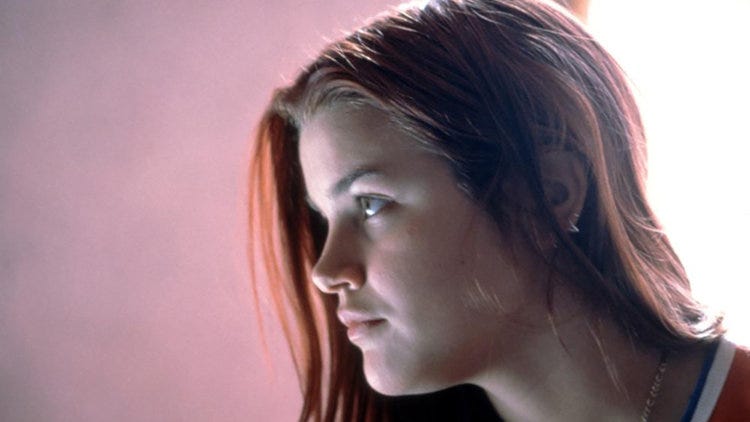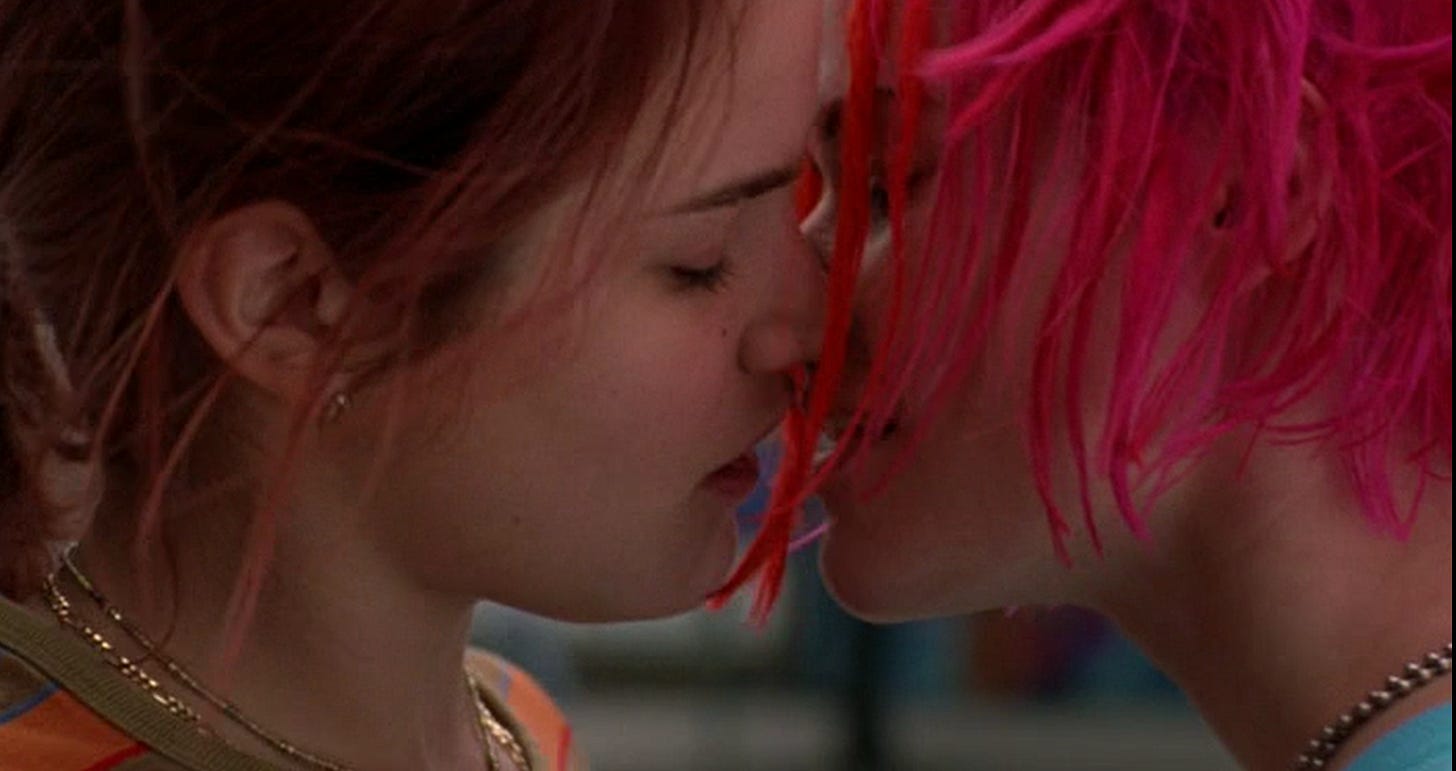all over me
Film, 1997, 5 stars
Directed: Sylvia Sichel
Written: Alex Sichel
The storyline for All Over Me might be above and beyond anything that most teenagers experience—it's not everyone who grows up in Hell's Kitchen surrounded by murder, drugs and violence—but the fundamental emotional responses the characters have are so universal the film still feels relevant almost thirty years after its release. This is an important, totally underrated and underviewed lesbian film, which is not bad for a film where the word "lesbian" is not once uttered.
Claude (Alison Folland) is fifteen and living in near poverty with her mother in one of the toughest neighbourhoods in New York. She's a bit shy, a bit overweight, works in the local pizza parlour, plays guitar badly, dreams of being in a riot grrl band and is starting to come to grips with her sexual feelings for another girl.
Claude dotes on her best friend Ellen (Tara Subkoff), something Ellen knows and takes endless advantage of. Everything changes when Ellen gets involved with a local street thug, Mark (Cole Hauser). Ellen finds herself over her head in a world of sex and drugs, and Claude is powerless to do anything except be there and cop the fallout.
Things come to a head when, after a bitter confrontation, Mark and his friends are implicated in the murder of Claude's gay neighbour. Ellen confesses her knowledge of the crime and Claude is faced with the decision of betraying Ellen and going to the police, or keeping the secret, despite knowing that would be betraying everything she is beginning to realise is true to herself.
In the middle of this, and through the haze that is her love for Ellen, Claude forms a mutual attraction to Lucy (Leisha Hailey in her first role), a pink-haired, rocker girl she meets at a riot grrl club. It is quickly obvious that this new, healthy relationship won't stand a chance unless Claude can break the shackles of her desperate connection with Ellen and emerge as her own person.
Along with savvy writing and directing, it is the near-flawless performances that make this film what it is. Alison Folland made three great films back to back before disappearing; this one (for which she was nominated for an Independent Spirit award), To Die For, and the chilling Boys Don't Cry. All Over Me quite frankly succeeds because of her moving and authentic performance.
Cole Hauser continues his lucrative career playing some of the best thugs on film (see also his riveting neo-Nazi in Higher Learning). Deserving of special mention is Pat Briggs as the gay neighbour Luke, and Leisha Hailey's sweet turn as the streetwise-yet-childlike Lucy.
The film was made using a grant to make a film about Riot Grrl music, so it’s no surprise that just as music plays a huge role in Claude's life, the film's soundtrack is like another character, with depth, variation and purpose. From the songs for Lucy's band, through the indie background tracks (from artists like Ani Difranco, Babes in Toyland, Cornershop, The Murmurs, and Helium), to the crushing emotion of Patti Smith's "Pissing in a River" played in a pivotal moment, not a single note is meaningless or wasted. It's a textbook example on how music can enhance a film, but not overpower it.
The most difficult lesson for Claude to learn is that no matter how painful it is, loyalty is important, but self-respect is more so. Despite everything she goes through, Claude never fully abandons her optimism and romanticism and, most of all, is not scared away from eventually trusting someone worthy with her emotions.
The best endings are when something is lost but enough is gained to make the sacrifice and pain worthwhile. All Over Me has one of those bittersweet endings that make you believe that if you are true to yourself you can make it through, no matter what happens. Ultimately this is the most positive message we can be sending to young lesbians struggling with their sexuality, even decades later.
The Sichel sisters never made another full-length feature. Imagine what they could have done with some industry support? When other people were still doing angsty coming out stories or throwing their characters off buildings, they were doing this, one of the two best lesbian teen dramas ever made. It’s a filmmaking crime.
Note: Even a decent trailer of this film is hard to find these days.







I own this movie on DVD. And the soundtrack on CD. And I always thought that I'm the only one who knows it. Thank you for this review. You totally nailed it (once again).